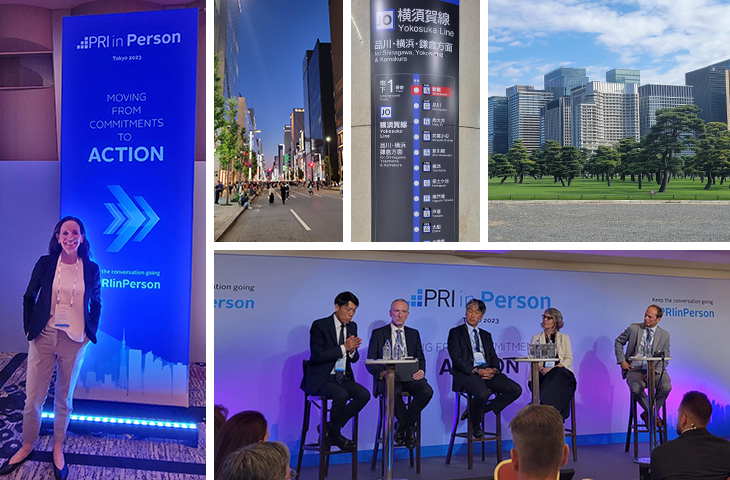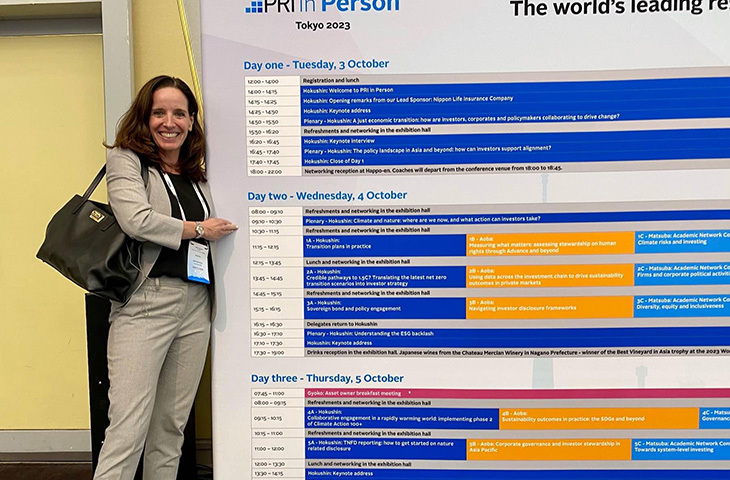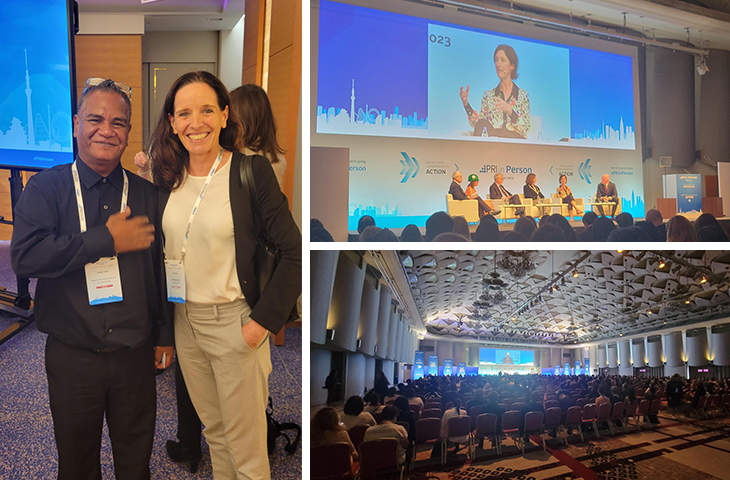UN PRI in Person 2023: More Action and Broader Perspectives
East Capital Group participated in the UN PRI in Person, the world’s leading responsible investment conference held in Tokyo from 3-6 October 2023. The conference brought together over 1000 asset owners, asset managers and service providers, from around the world.
Our Chief Sustainability Officer, who is a member of the PRI Signatory Advisory Committee, in charge of shaping the agenda ahead of the conference, shared with us that the committee had two important goals for this year’s conference: more actionable outcomes for signatories (reflected in the conference’s theme “Moving from commitments to action”), and broader perspectives through inviting more diverse speakers such as corporations, policymakers, NGOs and politicians thus avoiding any preaching-to-the-choir type of gathering. Below are some of our on-the-ground notes and impressions. We welcome any questions and reflections!

For only the second time ever, seven years after Singapore, the UN PRI organised its annual flagship conference in Asia. A very relevant location, considering the fact that the Asian continent is home to half of the world’s population and is the most vulnerable region to climate risks (for instance between 2000 and 2019, four out of the top five economies reporting the highest number of disasters are located in Asia: China (1st), India (3rd), the Philippines (4th) and Indonesia (5th)1). Asia consumes half of the world’s energy on one hand and on the other hand, it provides many critical parts of the value chains for green solutions as well as natural carbon-sink.
The conference was kick-started by the inspiring keynote speech of Japan Prime Minister Fumio Kishida, seemingly ready to mobilize trillions of Japanese’s savings and unleash the power of science, technology and entrepreneurship to green the world.
The PRI in Person is always a very intense conference, with meetings, seminars, side events and networking from early in the morning to late in the evening. Besides plenary sessions consisting of keynote speeches and panels, there are numerous break-out sessions and workshops. Thankfully for me, and the large delegation of fellow participants from Asia and Australia, the intensive program was easier to navigate, without jetlag, compared to last year in Barcelona! Feeling like a PRI conference veteran, and also well-prepared this year due to my involvement in the PIPSAC (PRI in Person Signatory Advisory Committee), I managed to limit the FOMO feeling through a pre-set strategy: avoiding the late nights with tempting sake, and making the most of the program by focusing on the sessions which met the two objectives we had agreed upon during the PIPSAC discussions: actionable outcome and broader perspectives.
The conference’s theme “Moving from Commitments to Action” was spot on. Compared to previous years, I felt that there was indeed much more focus on concrete actions such as workshops on transition plans in practice, new disclosure standards such as the TNFD (Task Force on Nature-related Financial Disclosure), sharing of perspectives on tools and collaborations to assess and limit deforestation risks, phase 2 of Climate Action 100+ (a 6 years-old global investor-led initiative to ensure the world’s corporate greenhouse gas emitters take necessary action on climate change) or the launch of Spring – a new stewardship initiative of the UN PRI to focus on nature-related risks. I couldn’t help but telling the people involved in the latter that Spring means “run” in Swedish and that indeed we should accelerate the pace for nature.

For me personally it was also a great opportunity to meet in person with many peers with whom we co-operate within various initiatives and associations such as the FSDA (Financial Sector Deforestation Action), IPDD (Investor Policy Dialogue on Deforestation), Climate Action 100+, Advance (focus on human rights), the recently launched Nature Action 100+ and our old friends at the Asia Corporate Governance Association with whom we have multiple collaborative engagements towards Chinese and Korean companies.
The topics covered had been carefully curated by the PRI staff, with support from the PIPSAC. Expectedly, the agenda centred around climate, while nature, including deforestation risks, was much higher on the agenda compared to previous years, and so were human and labour rights and the related topics of a Just Transition. What I missed was the topic on how responsible investors should approach the sustainability-related impact of artificial intelligence; I expect this topic debate to become more prominent going forward.
Below is a selection of highlights per topic from the multiple sessions and discussions I had in the course of three intensive conference days and some personal takeaways.
Climate
There is a growing realisation about looming physical climate risks, even in low-carbon scenarios. The 21st century's challenges encompass migrating from mitigation strategies to adaptation.
KH: After years of focus on climate mitigation, it is indeed (sadly) time to really get to work on climate adaptation and invest in resilience. Just before going to Tokyo, I had just weathered the heaviest rainfall in history at home in Hong Kong.
Achieving net zero seems challenging, as it would require an annual capex of 1.3 trillion USD, while only around 700 million USD is currently available. The importance of carbon pricing as a mechanism for carbon reduction cannot be underestimated.
KH: The window for the 1.5-degree is closing before our eyes, only 7% of polled delegates considered it still reachable. A base-case scenario anticipating a 2.4-degree increase, assuming a 25% reduction in GHG emissions is absolutely catastrophic and will imply massive damages.
GHG emissions are expected to fall with an increase in cleantech and renewables investments, which are projected to be the growth story of the coming decades.
KH: These sectors fell out of favor when the interest rates started to rise but the long-term investment case remains intact and has delivered very strong returns over the last five years. My colleagues and myself being on-the-ground are very well-equipped to closely follow the largest and most dynamic market for these industries, namely China.
Climate and nature show intricate dependencies. For instance, land use, especially in Southeast Asia, is a significant source of climate change mitigation. At the same time the green transition requires resources from nature such as minerals, land or seabed to install wind farms.
KH: The concept of the SDG conflicts, which intensity and scope differs across geographies and levels of economic development, is increasingly in focus; how we will solve them is a defining moment for humanity.
Nature and Biodiversity
There is a strong need for investors to use tools which offer traceability and data through the value chain, for instance to track deforestation activities and ensure responsible sourcing. For investors to be able to properly assess and mitigate nature-related risks, companies ought to disclose localized data, easier said than done for businesses which operate across multiple geographies.
KH: No surprise data-providers and starts-ups are getting excited about this new goldmine! Since localized data is also needed for physical climate risk assessment, we might hit two birds with one stone (no pun intended) and get more granular data very soon. Also, since climate and nature are deeply intertwined, investors can engage on both topics in their dialogue with companies.
Solution-providers and companies that minimize their impact on nature, for instance waste recycling, water management, soil pollution restoration are pivotal.
KH: If today these “nature positive contributors” are hard to come by and completely inexistent in some markets and asset classes, one can expect that there will be many more in the near future, as requirements increase, including from responsible investors like ourselves, regulatory frameworks are implemented and client demand soars.
Nature and biodiversity are complex and multi-faceted, still leaving lots of room for interpretation in the years to come, hence it is paramount to establish and implement standards.
KH: It makes it easier that the TNFD standards follow the TCFD framework’s four pillars, but six years down the road after TCFD recommendations were launched, only 4% of TCFD supporters align with all TCFD recommended disclosures - so let’s not get too complacent.
The task of identifying which sectors represent high single or double-materiality risks on nature and biodiversity is fairly simple there is a consensus view on food and beverage, pharmaceuticals, materials and mining.
KH: Mapping is one thing, further assessing and quantifying the risks, as well as mitigating them is much more difficult; we all need to get our heads around this, and quickly. It is estimated that half of the world’s GDP is moderately or highly dependent on nature.
Human Rights and Just Transition
Most environmental issues, such as climate change transition and physical risks, loss of biodiversity, and sourcing of green materials, have a social impact which remains less well explored. Social unrest around the world reminds us of the risks that must be addressed now and where short-term planning is required.
KH: While responsible investors have to take action, for instance through stewardship and asset allocation, these hugely complex issues require also engagement with other stakeholders and policymakers.
Implementation challenges when incorporating human rights can be mitigated through “preventive” and investigative processes. Investors should first map the risk materiality in their portfolios and also deepen their assessment across value chains. Alternative data sources and external assurances are critical in this work.
KH: The more I think about it, the more convinced I am that we will eventually start using the Scope 1, 2 and 3 frameworks also for human rights. Scope 1 relates to own labour force, Scope 2 relates to supply chain and communities and Scope 3 is about the use of companies’ products and services, downstream, with an impact on human rights.
While sectors such as manufacturing, materials and mining, and construction sectors have traditionally been in focus for social rights (including health &safety and labour rights), digital technologies and services are not free from material sustainability topics such as data privacy, children’s rights, controversial dual use of technologies and digital addiction.
KH: As big tech dominates many markets and economies, and companies need to be made accountable, we, as responsible investors, welcome more focus on these topics within the industry. Our upcoming new strategy, Espiria Global Innovation, will definitely have them as a key priority for risk assessment and engagement with our portfolio holdings.
New technologies help with data challenges. For instance, AI and blockchain technologies can be applied to trace sourcing of material and mining and Large Language Models can help scrape unstructured data such as local news and social media. Asset geolocation which is required for physical climate risk assessment and nature-related risk analysis should also be leveraged for monitoring of human and labour rights in supply chains.
KH: The imperative for investors to be more granular in their approach, looking at where assets are located, is clear. This resonates well with our on-the-ground approach.

Two key-note speeches made a lasting impression on me: one from Keiden Kintol, from the Republic of Palau, who described, one after the other, the climate crisis effects on their island nation and communities, such as ocean acidification, coral bleaching, rising sea levels, extreme weather events, water/food scarcity, health risks and economic impacts.
The second one was from Dr Parag Khanna, the Founder & CEO of Climate Alpha, Future Maps who articulately described the world of tomorrow, introducing the idea of several geographies: resources, borders, infrastructures, and demographics, which are increasingly misaligned, creating huge pressure and pains going forward. According to Dr Khanna, the 21st century will witness a shift wherein climate refugees will surpass the number of political refugees. At the same time, it is essential to reframe the migration discourse and also see it as an opportunity. Collaborative initiatives, such as global skill partnerships in essential sectors with labour-exporting countries like Mexico, Nigeria and the Philippines, can pave the way for a more inclusive approach to migration.
Both speeches above were not the most reassuring and positive messages on which to end the conference nor this report, but there is no time for complacency. We have crossed 6 out of 9 planetary boundaries and we are lagging most SDGs targets, eight years after the signature of the Paris Agreement with only seven years left to achieve the 2030 Agenda. What stands out however is the collective acknowledgment of the issues at hand and the shared responsibility to address them. The current ESG backlash in the USA, which was discussed in a very interesting plenary session, does not seem to deter anyone.
As we move forward, these insights will be instrumental in shaping our strategies and priorities. It's evident that a multi-faceted approach, combining technology, policy-making and collaborative initiatives will be essential. The onus isn't just on global leaders but on each one of us, as investors and individuals, to leverage these insights for actionable change. The journey ahead is challenging, but armed with knowledge, collaboration, and determination we are better poised to make a difference.
Snippets from panels, keynotes and personal conversations over sushi and coffee
- Turning a blind eye to all the sustainability problems will not make them go away.
- We need more ambition; we need more action and we need it now. In a world facing global boiling, responsible investors shall not be change-takers, but change-makers.
- The G20 and UN agenda ought to change so that they become dedicated to the Just Transition.
- The Global South should leapfrog the fossil fuel phase and get all the support developed countries have pledged but not yet disbursed.
- We have nowhere to hide from nature issues, we already have plenty of nature risks in our portfolios.
- ESG backlash aside, at CalSTRS, we have not changed the way investments are made, we remain long-term and we need to be because Californian teachers live for a very long time!
- Come to Palau, climate change is definitely not a myth, contrary to what Trump was saying.
- Asian youth, with 12 times more millennials than the US or Europe, is the future of humanity.
- We vote against directors of companies not reporting to CDP, period.
- You need a body-check every year, do the same on your portfolio regarding physical climate risks, identify where the problems are, and prioritize which actions are needed.
- Thanks to the SFDR, data providers business is growing faster than the AuM of their clients.
- There are two imperatives if we don’t want to discard the Paris agreement: end coal and end deforestation. Europe anti-deforestation law is a game-changer.
- Our job, as responsible investors, is not to fight politicians; that would mean we are becoming politicians!
- A 1% to 5% risk for a “centennial flood” means that a warehouse can be flooded every 20 years, and it also means it can happen tomorrow.
- Start by asking the company: “how can we help you” and tell them you want to succeed together.
- A collaborative engagement team is like a football team, depending on how it is led, it is either like 6-year olds running everywhere uncoordinated on the field, or a team of coordinated professionals who score.
- You cannot have transition finance without transition plans.
- Humans chose “fight or flight”. But it does not work this way with nature.
1 Data from the UN Office for Disaster Risk Reduction (UNDRR)
Documents & links











